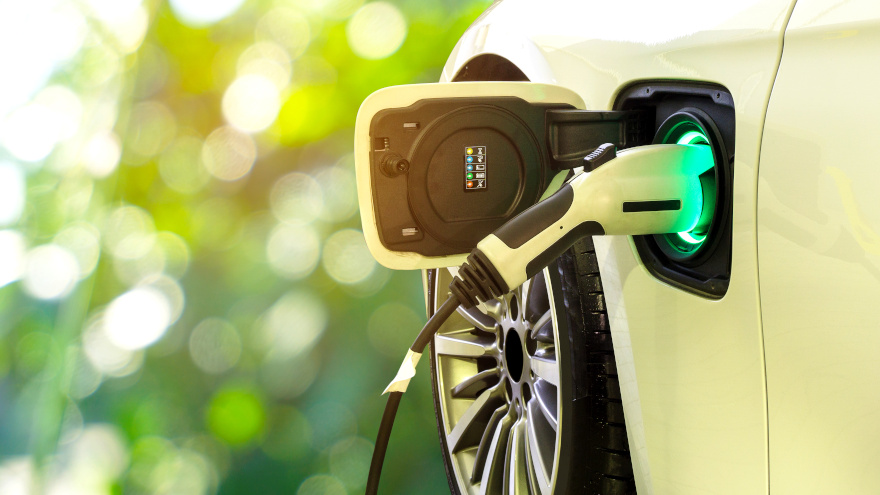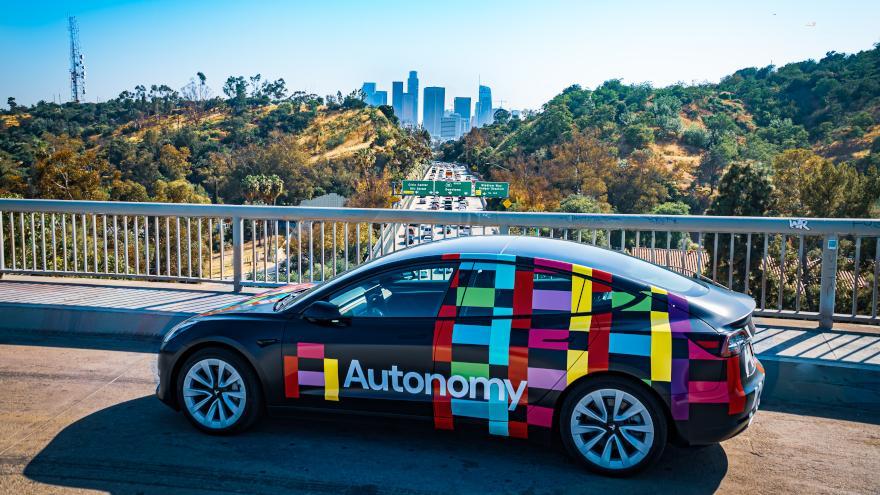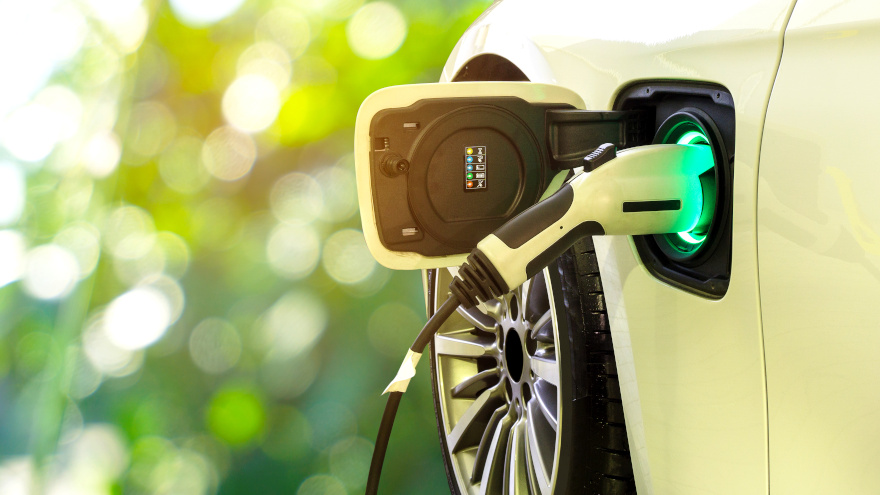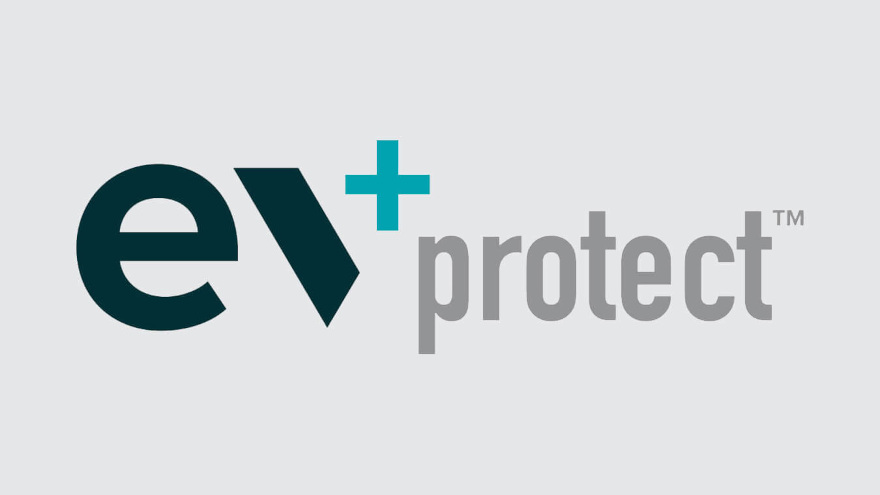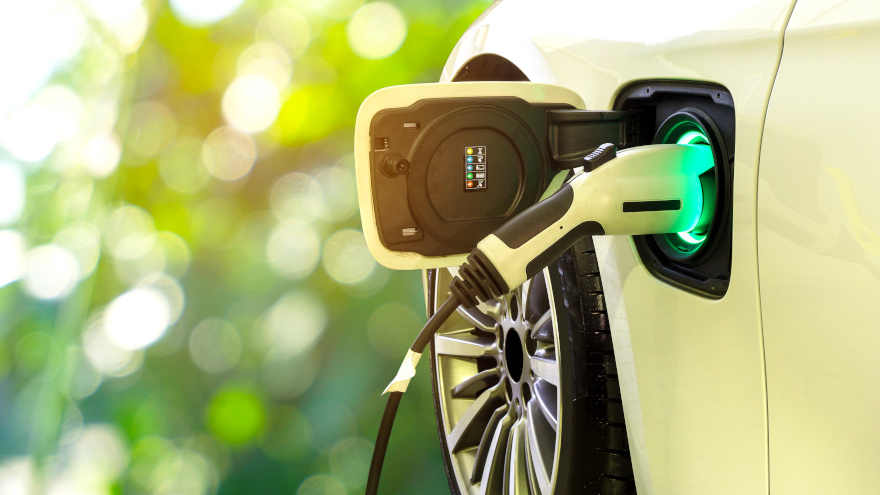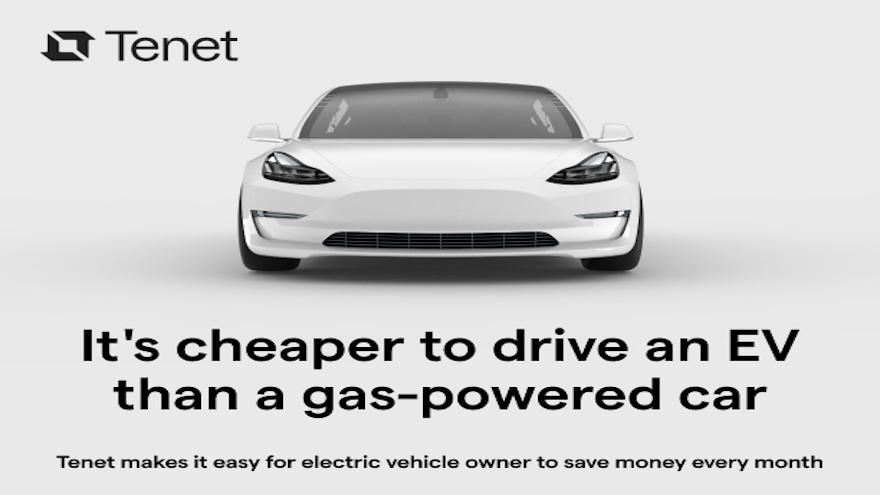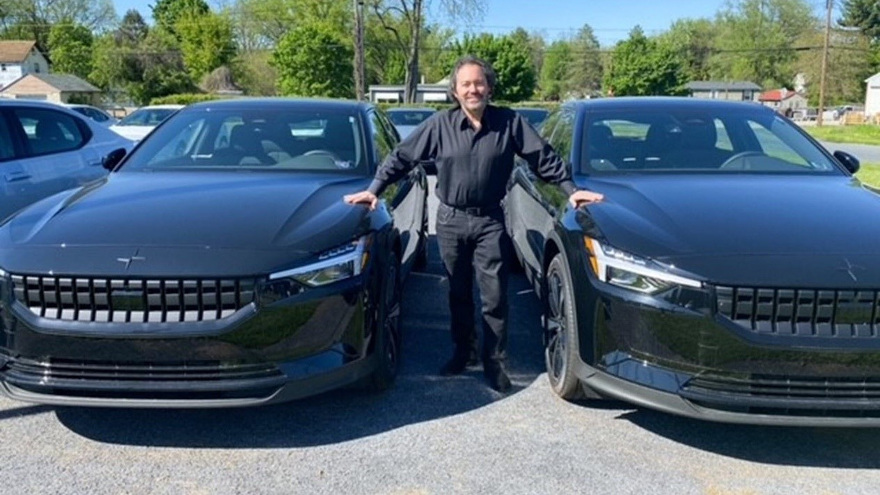Last week, Tenet announced that the company has secured what it believes is the first-ever electric vehicle (EV) only warehouse facility to make EVs more affordable.
According to a news release, Tenet has entered into a warehouse financing agreement of up to $20 million with Silicon Valley Bank (SVB) to fund Tenet’s EV installment contract.
Tenet said it has “redefined” the financing model for EVs, helping consumers connect to ESG capital markets to save hundreds of dollars each month on their EV payments.
Tenet is looking to leverage a changing landscape.
This year, California approved the Advanced Clean Cars II rule, which states that by 2035, 100% of new vehicles and light trucks sold in California must be zero-emission vehicles.
Company leaders say this sustainable financing facility by SVB empowers Tenet to lead the charge in ESG financing by lowering the cost of ownership for EVs and sustainable home electrification.
“We’re thrilled to work with the Silicon Valley Bank team because this is an industry-first,” Tenet co-founder and CEO Alex Liegl said in the news release. “Our partnership reinforces Tenet’s mission to become the all-in-one ESG financing platform by building financial technology to combat climate change. They have been great collaborators through this process and can help us scale with the potential to significantly upsize the facility over time.
“We are ready to tackle the issue of EV affordability from coast to coast together with the SVB team,” Liegl added.
Nick Christian is head of specialty financing for Silicon Valley Bank.
“Silicon Valley Bank is committed to supporting the climate technology and sustainability economy. Working with companies like Tenet, who are at the forefront of helping consumers fight climate change, is a top priority for us,” Christian said.
“We are proud to support Tenet ‘s growth as they continue to redefine the financing model for EVs and make the switch to driving electric more affordable,” he went on to say.
To learn more about the company, visit www.tenet.com.
Nova Credit and Autonomy now are collaborating to help consumers with a ‘thin file’ or no credit history become electric vehicle subscribers.
The consumer-permissioned credit bureau announced a partnership with the electric vehicle subscription company on Wednesday that will merge Autonomy’s application process with Nova Credit’s cash flow underwriting solution, Cash Atlas.
The companies said the collaboration will allow Autonomy to qualify a greater number of customers with ‘thin file’ or no credit history for a vehicle subscription.
Executives added this streamlined, data-driven process will help Autonomy sustain rapid yet qualified customer growth as it expands into additional geographies and other in-demand electric vehicles.
“Being able to automate the underwriting decision for customers that don’t have traditional credit histories, yet represent a great customer fit for our product, is the goal of this partnership,” said Autonomy founder and CEO Scott Painter, who will make multiple appearances during Used Car Week, which starts on Nov. 14 in San Diego.
“Implementing Nova Credit’s Cash Atlas product will allow us to look beyond the traditional definitions of creditworthiness and help get more customers access to electric vehicles while ensuring that the performance of our subscription fleet remains radically better than traditional auto finance. Empowering customers through financial inclusivity is at the core of our mission and aligns with Nova Credit’s own mission,” Painter continued in a news release.
While traditional credit bureau reports have been the anchor data source for credit risk assessment in the industry for years, Nova Credit said they leave gaps in evaluating a customer’s complete financial background and creditworthiness, and limit opportunities for businesses to offer services to large portions of the population.
Nova Credit’s Cash Atlas is designed to bridge this gap by transforming consumer-permissioned bank transaction data into a Fair Credit Reporting Act (FCRA) consumer report, informing businesses’ lending decisions by painting a more holistic view of a customer’s financial health.
Autonomy said it will embed Cash Atlas directly into its application process, giving prospective customers the immediate opportunity to provide additional bank statement data to present a more comprehensive view of their financials and thus increase their chances of approval.
With this capability, Autonomy will be able to automate credit risk decisioning based on a customer’s bank transaction data rather than simply relying on traditional credit reports, which glean insights from credit behavior that can be limited and months behind. The partnership allows Autonomy to increase efficiency and reach more customers, without sacrificing payment risk.
“To date, traditional credit data-based underwriting practices have unintentionally excluded a broad swath of consumers from smart financial options like vehicle subscription services — an important solution for those who want to test the EV waters but might not be ready to commit to purchasing a car,” said Misha Esipov, co-founder and CEO of Nova Credit.
“This partnership allows Autonomy to better serve the mainstream and credit-excluded consumers who may not be aware that they are even eligible for these subscriptions. Cash Atlas allows users to paint a more complete picture of their financial identity and in doing so allows lenders to make a more fair and informed risk decision,” Esipov went on to say.
More shops are collaborating to boost financing and ancillary products tailored specifically for electric vehicles.
Tenet, a leading EV financing platform, announced a partnership this week with Xcelerate Auto, a financial technology company with an emphasis on electric vehicles, to couple its EV extended warranty into Tenet’s financing options.
Xcelerate Auto said it designed the first and only electric vehicle service agreement for Tesla in 2019. With this partnership, Tenet customers will now have access to package XCare with their current installment contract.
The provider explained XCare, a comprehensive exclusionary service coverage, is the highest level of coverage that a vehicle qualifies for outside the manufacturer’s warranty, meaning Xcelerate Auto will cover the entire vehicle with the exception of certain excluded items.
Since XCare was originally built for Tesla, it was designed to work around Tesla’s direct-to-customer service model, so owners will not have to worry about servicing their vehicles in any different way than intended by Tesla Service.
“We couldn’t be more excited for this partnership and the opportunity to provide products like XCare EV Protection to Tenet and its drivers,” Xcelerate CEO KJ Gimbel said in a news release. “The moment we met the Tenet team, we recognized the same mission-driven mentality in each other and knew this was the perfect recipe to collaborate. We expect big things to come and can’t wait to work together on our shared mission of making EVs affordable for the average consumer.”
Tenet co-founder and CEO Alex Liegl said, “Working with a company whose mission aligns with ours to revolutionize the EV buying experience is the perfect complement to what we do at Tenet. We are excited to partner with KJ and the Xcelerate Auto team to make Teslas and all EVs more affordable, and look forward to ushering in the mass adoption of electric vehicles.”
To learn more, visit www.tenet.com.
Last week, JM&A Group enhanced its F&I product offering with the introduction of EV+ Protect.
JM&A Group highlighted EV+ Protect represents an expanded suite of products tailored specifically to meet the nuanced needs of electric vehicle owners, while introducing the company’s comprehensive platinum and powertrain limited warranties for pre-owned electrified vehicles — offering protection for one year or 12,000 miles.
“While JM&A has been providing trusted EV and hybrid products for years, this new portfolio of branded offerings gives customers a full suite of options to protect their vehicles in the way they see fit,” said Josh Bass, vice president of inovation at JM&A Group. “As customers purchase their first and even second fully electric vehicles, dealers should be prepared to address new questions and help educate shoppers.
“Having a brand like EV+ Protect allows dealers to, very simply, convey a level of personalized protection to generate peace of mind quickly, while also increasing customer satisfaction,” Bass continued in a news release.
Protection includes, but is not limited to:
All-new pre-owned electric vehicle warranty
—Comprehensive platinum and powertrain limited warranty protection options that can be provided with pre-owned EV sales
—Multi-point vehicle inspection, including analysis for outstanding recalls, full road test, tire and brakes, transmission and electrical components
Vehicle service contract
—Mechanical breakdown protection of the battery and charging system
—Covered repairs for the electric drive motor, electric power inverter, battery management system, battery thermal system, and electrically driven accessories
Total Loss Protection (GAP)
—After a total loss, there may be a “gap” in value from the amount owed and the actual cash value of the vehicle. The Total Loss Protection Plan was created to help consumers bridge that gap for new or used vehicles.
Maintenance plan
—Valuable car care services, such as tire rotation and multi-point inspection, are available for electric vehicles with different mileage intervals: 5,000, 7,500, 10,000
Battery coverage
The vehicle service contract and limited warranty products provide mechanical breakdown coverage for EV batteries
Additionally, EV+ Protect customers can select from a national network of more than 6,000 authorized service centers or any licensed repair facility in the U.S. to ensure their electric vehicle is ready for the road ahead.
For dealers, Bass said EV+ Protect will provide the opportunity to have a proven product mix that maintains their ability to offer protection options for their customers across various manufacturers. In particular, the new limited warranty product is a timely tool as early-model EVs begin entering the used market.
“As EV adoption continues to grow among consumers, JM&A is committed to long-term investment and innovation in EV+ Protect products and services,” Bass said.
“Particularly with manufacturers committing to new technology and infrastructure developing across cities nationwide, EV+ Protect™ will serve as an umbrella brand of protections that can continue to evolve and grow with the segment.”
For more information on EV+ Protect and the full menu of JM&A Group offerings, visit www.evplusprotect.com.
Growing adoption of EVs means more of those vehicles likely are flowing through your finance office.
This week, National Auto Care announced the launch a vehicle service agreement, lifetime limited warranty and lifetime battery limited warranty, all developed exclusively for electric vehicles.
The company said the product line provides coverage for both new and pre-owned EVs, making it simple to adapt to customer needs.
NAC explained that it took a unique approach to vehicle rating by utilizing vehicle MSRP for EV classification. This process can allow for a one-page rate card compared to hundreds of rate card pages.
Instead of more than 20 classes, NAC’s EV product line trims it down to only four.
NAC went on to say that this new EV-exclusive suite of products can enable dealerships to deliver forward-thinking coverage plans that protect key components.
“As EVs evolve, we will continue to push boundaries. Other manufacturers may have EVs in their service agreements and limited warranties, but NAC puts them at the forefront of our new product line,” NAC chief executive officer Tony Wanderon said in a news release.
“With nearly 40 years as an award-winning administrator, National Auto Care will provide you with a solution that fits our clients’ needs — today, tomorrow and for years to come,” Wanderon added.
For more information, call (800) 548-1875.
A new TransUnion study conducted in collaboration with S&P Global Mobility determined the registered electric vehicle market share is expected to grow from 5% at the end of 2021 to approximately 40% by 2031.
Analysts also found that the increasing popularity of such vehicles will have a marked impact on the auto finance industry, as the credit risk profile of consumers purchasing them differs dramatically from those buying traditional gasoline-powered vehicles.
For the purposes of this research, TransUnion and S&P Global Mobility pointed out in a news release distributed on Wednesday that only fully battery-powered electric vehicles (EVs) are included, and not plug-in hybrids. The firms pointed out that traditional internal combustion engine vehicles (ICE) include gasoline, diesel and ethanol vehicles.
They said the study also accounted for luxury and mainstream vehicle types. Approximately 76% of EVs are classified as luxury compared to 16% of ICE.
“Consumer interest in electric vehicles from Tesla, Ford, Nissan and others is only going to grow in the next decade and meeting the unique demands of these buyers will become a business imperative for auto dealers and lenders,” said Satyan Merchant, senior vice president and automotive business leader at TransUnion.
“Our research clearly shows that electric vehicle buyers have excellent credit risk profiles, but this group also has varying preferences, including a larger appetite in shopping around for vehicle financing by digital means,” Merchant continued in the news release.
Credit profile of EV buyers
TransUnion’s study examined the credit risk of both EV and ICE buyers.
Analysts indicated the average credit scores for EV buyers — both those purchasing mainstream or luxury vehicles — was greater than all ICE buyers.
Furthermore, TransUnion noticed EV buyers secured lower interest rates for their vehicle purchases. This was partly due to having better credit risk profiles and because they have lower loan to value (LTV) rates than typical ICE buyers.
Analysts explained loan-to-value is a ratio that is determined by dividing the amount borrowed (including sales tax, title and licensing fees) by the total cost of the vehicle.
Controlling for credit quality, TransUnion noted both mainstream and luxury EV buyers have lower serious delinquency rates versus mainstream and luxury ICE buyers.
For instance, the 60 days past due rate after 12 months for mainstream contracts originated in 2020 was 0.72% for EV and 0.92% for ICE.
For luxury vehicles in the same timeframe, EV had a 0.27% delinquency rate compared to 0.67% for ICE.
“It’s clear that electric vehicle buyers have a stronger credit risk profile than consumers who purchase traditional autos,” said Eric Kohn, co-author of the study and vice president in TransUnion’s automotive business. “In fact, credit performance as measured by serious delinquency rates for mainstream electric vehicle buyers more closely resembles traditional luxury buyers.
“This points to the overall electric vehicle market being both less risky for lenders as well as a more competitive marketplace in securing consumers’ business,” Kohn continued.
EV Buyers Generally Have a Stronger Credit Profile and Make Larger Down Payments
|
Car Buyer
|
Average Credit Score
|
Average APR
|
Average LTV
|
|
ICE Mainstream
|
735
|
4.3%
|
102.2%
|
|
EV Mainstream
|
775
|
2.8%
|
91.6%
|
|
ICE Luxury
|
769
|
3.1%
|
95.3%
|
|
EV Luxury
|
775
|
2.8%
|
88.8%
|
Source: TransUnion
EV buyers conduct more online shopping
TransUnion’s study also included a survey of 1,480 U.S. vehicle owners for their thoughts on electric vehicles and financing.
The survey found that consumers who own or are considering purchasing an EV are more interested in online car shopping and financing experiences.
TransUnion reported more than one-third of EV owners (35%) and those considering buying an EV (36%) conduct research on vehicle makes/models online while this percentage declined to 28% for all other vehicle buyers.
As for understanding financing and monthly payments and completing financing, survey orchestrators found there was an even more dramatic shift in online use for those owning or considering EVs versus all other vehicle owners.
According to the findings, approximately 36% of EV owners said they go online to understand financing/monthly payments with 32% completing financing online.
For all other vehicle owners, TransUnion said the percentage going online to understand financing/monthly payments dropped to 24% with only 16% completing financing online.
“Electric vehicle owners and considerers are far more likely to want to understand what they can afford online and they are more likely want to complete financing online,” Merchant said.
Online prequalification at the start of the shopping process will help lenders capture more EV buyers. As a result, end-to-end digital retailing in partnership with dealers will be critical for lenders,” he concluded.
Tenet recently made progress on multiple financial fronts.
First, the company unveiled a new financial solution intended to lower the cost of ownership for electric vehicles “that rejects standard car depreciation models and values EVs as clean collateral.”
Tenet also plans to expand into zero-emission home upgrades to help consumers better achieve their financial and sustainability goals.
And to make it all possible, the company also announced that it has raised seed funding of $18 million, led by Human Capital and Giant Ventures with participation from Breyer Capital, Global Founders Capital, Firstminute Capital, and prominent angel investors including Michael Tannenbaum, Gokul Rajaram, Michael Ovitz, and more.
Tenet explained in a news release that the company sees traditional auto financing options not accounting for the long-term value that EVs can retain, “resulting in unnecessarily high monthly payments and a disconnect between the smart financial decision and the sustainable one.”
By leveraging EVs’ residual value, Tenet has looked to redefine the terms of a traditional auto installment contract and create an innovative financial solution that will drive even wider adoption of zero-emission technologies.
“With inflation hitting its highest levels in two generations and people paying record prices at the pump, the demand for EVs will continue to grow exponentially,” Tenet co-founder and chief executive officer Alex Liegl said in the news release. “We’ve created a new model for EV financing that incentivizes consumers to adopt new zero-emission technology and will continue expanding our offerings to support sustainable improvements for the entire home.
“We believe in change — putting more change in your wallet and changing the future of climate-positive financing,” Liegl added.
Tenet highlighted that its finance offerings include:
—Monthly savings: Customers can achieve financial goals without sacrificing sustainability goals by saving up to $200 per month.
—API-enabled decisioning within seconds: Tenet’s financing technology allows for immediate underwriting decisioning for consumers and embedded financing options with partners.
—Tracking financial and CO2 savings: Optimize your EV’s efficiency, track your mileage and battery health, and manage payment settings from anywhere with the Tenet dashboard.
That trio of offerings and the company’s ambitious objectives seemed to have impressed the investment community.
Tenet said the seed funding will be used to accelerate growth, grow its team and roll out additional products to better serve its climate and savings-minded customers.
“We’ve been inspired by Alex’s ambitious vision for building the next generation fintech company that rewards consumers for decarbonizing their lifestyle,” Human Capital co-founder and president Baris Akis said in the news release. “We are thrilled to support Tenet as they build and scale the right team to drive their journey."
Cameron McLain, co-founder and managing partner of Giant Ventures, added, “Tenet is reimagining the financial system to accelerate the adoption of climate-positive products. We are excited to work with Tenet as they unlock scalable access to high-quality ESG assets for their institutional investor partners.”
To learn more, visit www.tenet.com.
Financing for electric vehicles continues to gain more momentum.
A few days after Bank of America finalized a relationship with Lucid Group, Arcimoto announced on Wednesday that manufacturer has entered into an agreement with FreedomRoad Financial, a loan production office of Evergreen Bank Group, to provide consumers with vehicle financing for Arcimoto’s family of EVs.
“This is a milestone for Arcimoto and our customers, and FreedomRoad Financial’s dealer financing solution will make it easier than ever to own an Arcimoto electric vehicle,” Arcimoto chief experience officer Lynn Yeager said in a news release.
FreedomRoad Financial is one of the largest U.S. national powersports finance companies, providing retail financing to riders on numerous brands.
“We are proud to add Arcimoto as our newest OEM and to help their customers realize their dreams of owning an FUV, one of the most exciting and innovative new EVs on the market today,” FreedomRoad Financial managing director Tom Collins said in the news release.
Here’s another development involving EVs and shorter consumer obligations.
Ferry, an electric vehicle subscription platform that allows consumers to obtain short-term leases on new EVs, announced this week it has partnered with Inspiration Fleet to make Tesla Model 3s and Model Ys available to customers in Austin, Texas.
Ferry said it has also reached more than 5,000 app downloads, marking what it called a key milestone in the company’s mission to make sustainable mobility a reality for all Americans.
The companies highlighted Inspiration Fleet’s flexible, tailored financing enables Ferry to offer Tesla and other electric vehicles to its customers via an attractive subscription package, and allows Ferry to quickly enter new markets with a scalable operations architecture.
The companies also mentioned this partnership advances the progress made in February when Ferry announced a $4 million seed round led by prominent automotive industry investors and in May when Ferry announced its first deliveries of the Vespa Elettrica in Austin, as well as its expansion into the San Francisco and Los Angeles markets.
Ferry said it has already had strong demand for its simple, flexible, all-in-app EV leasing experience, with more than 2,500 app users in Austin alone and thousands of “wishlist” selections for EVs that will soon be available for delivery, since going live in November of 2021.
“At Ferry, we believe in a future where electromobility is for everyone, and we’re proud to work with a visionary company like Inspiration to ensure that mission becomes a reality,” Ferry founder and chief executive officer Kristian Russell said in a news release.
“By partnering with Inspiration, Ferry will help accelerate the adoption of sustainable driving by pushing the American auto sales industry into a more digital, and more flexible future, at more and more attractive customer price points,” Russell continued.
Unlike other car-subscription offerings, Ferry said it charges no down payment or initiation fee and offers a single, transparent monthly payment to e-curious customers who may not want to commit to a 36-month lease or purchase term.
Through Ferry’s app, users can select a short-term (six-, 12- or 24-month) lease for delivery to their door, purchase insurance, and access a map to find the nearest charging stations.
Ferry added that 1,000 miles per month (with the ability to upgrade), maintenance and taxes are all included, and a Ferry ambassador delivers the car for a flat fee of $99.
Ferry is currently delivering the following EV models to Austin customers:
• Vespa Elettrica from $179/month
• Tesla Model 3 subscription from $799/month
• Tesla Model Y subscription from $999/month
Josh Green is founder and CEO of Inspiration Mobility, Inspiration Fleet’s parent company.
“Ferry and Inspiration have a shared goal to accelerate electric vehicle adoption,” Green said. “We believe that Ferry’s affordable and flexible subscription options for drivers interested in ‘going electric’ can increase consumer trial and experience, which in turn drives enthusiasm and broader adoption.
“We are proud to support them in their efforts to democratize access to EVs and electric mobility in the United States,” Green went on to say.
DriveItAway founder and chief executive officer John Possumato wants to give consumers as many options as possible when using the company’s electric vehicle subscription to ownership program.
On Wednesday, DriveItAway Holdings launched an initiative with Polestar 2 for anyone who would like to drive and try a new luxury EV vehicle before making a commitment to purchase.
“We found that many people are hesitant to make a commitment to buy a brand-new EV,” Possumato said in a news release “We designed the program so that anyone can immediately drive a Polestar 2 with no commitment to purchase, in a fast, easy, and inexpensive way with the vehicle subscription managed entirely through our mobile app.
“Turn-key and complete, our program includes insurance, maintenance and delivery right to your door, and, only with our unique program, a portion of subscription fees goes towards the purchase price, should you choose to buy the vehicle,” he continued.
The DriveItAway program can provide new EV manufacturers and legacy OEMs a new distribution channel for their vehicles, as it provides an “infinite test drive” to a full range of consumers, from entry level to luxury buyers, to satisfy a market that is “EV curious,” but does not want to make an immediate commitment to purchase.
DriveItAway’s EV subscription program is now starting in the greater Philadelphia area with the Polestar 2, but will soon offer a full range of EVs, including Chevrolet Bolt/Bolt EUVs, Nissan Leafs and even Ford Escape Plug In Hybrids, throughout the United States.
DriveItAway highlighted that its unique ‘EVs for Everyone’ program is the perfect “vehicle” to reduce the barriers to EV adoption for all drivers, perfect for people who are interested in an EV, but are put off by the higher initial cost as compared to a gas vehicle or are concerned about suitability and range anxiety.
“The future is zero emission vehicles,” Possumato said. “And the future of consumer EV adoption is propelled by a flexible subscription with optional ownership, with the money paid in applied towards the purchase.”
The company pointed out the driver has the right, but not the obligation, to buy the vehicle he or she is driving, with money paid in, given back as a bonus coupon toward the purchase.
Elena Ciccotelli, automotive partnerships manager at Lyft and a previous Women in Retail honoree, recently chose a new DriveItAway Polestar 2 on the program. She also found an additional benefit to the process.
“Used car values are sky high right now, so I was eager to sell my used car for top dollar,” Ciccotelli said in the news release. “But I didn’t want to buy a new vehicle right now during the car shortage, with limited selection and high prices. Also I very much support Lyft’s pledge to be 100% EV by 2030, so I made the commitment that my next vehicle would be EV zero emissions.”
“The DriveItAway app checked off all of the boxes. It gives me a new Polestar 2 EV immediately, with no commitment, to drive as long as I like, with the option to buy with the money I paid in. It truly seems like the best of everything, and gave me the ability to sell my used car at top dollar today. It’s a great way to get green by going green,” she went on to say.
Matthew DeSantis, a recent college graduate, had a different but similar way of being both environmental and financially responsible.
“My education was expensive, and I have a lot of student debt, so while I need a car right now to get to work, the last thing I need is more debt to buy a car, especially today with the current record high prices,” DeSantis said in the news release.
“At the same time, I wanted to go green as zero emissions is important to me,” DeSantis continued. “DriveItAway was the best alternative with no long-term financial commitment — perfect for me.”
For further information, go to www.driveitaway.com.

